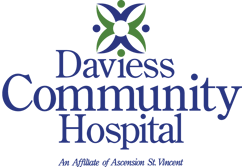
Nuclear Medicine
Advanced Nuclear Medicine Imaging for Accurate Diagnoses
Nuclear medicine is a highly specialized imaging technique that uses small amounts of radioactive materials (radiotracers) to provide detailed insights into organ function and disease progression. Unlike traditional imaging, which focuses on structures, nuclear medicine scans show how organs and tissues function in real time—helping diagnose heart disease, bone disorders, thyroid conditions, and more.
At Daviess Community Hospital, we use the latest nuclear imaging technology to deliver fast, safe, and precise diagnostics, allowing doctors to detect diseases earlier and provide effective treatments sooner.
Why Choose Nuclear Medicine at DCH?
- Early disease detection – Identifies conditions before symptoms appear, improving treatment outcomes.
- Minimally invasive & low radiation exposure – Safe, effective, and requires only small amounts of radiotracers.
- Highly accurate functional imaging – Detects how organs work in real time rather than just showing their structure.
- Expert care – Performed by certified nuclear medicine technologists and interpreted by board-certified radiologists.
What Can Nuclear Medicine Detect?
- Heart disease – Evaluates blood flow, heart function, and blocked arteries (Myocardial Perfusion Scan).
- Bone disorders – Detects osteoporosis, stress fractures, arthritis, and cancer spread to bones.
- Thyroid conditions – Identifies overactive thyroid (hyperthyroidism), nodules, and thyroid cancer.
- Lung scans – Assesses blood flow and detects pulmonary embolisms (blood clots in the lungs).
- Cancer detection & monitoring – Helps locate tumors and evaluate treatment effectiveness.
- Gastrointestinal issues – Diagnoses stomach emptying disorders and bleeding in the digestive tract.
Types of Nuclear Medicine Scans We Offer
-
Myocardial Perfusion Scan (Nuclear Stress Test)
- Evaluates blood flow to the heart and detects coronary artery disease.
- Helps determine the best treatment for chest pain, shortness of breath, and heart disease symptoms.
-
Bone Scan
- Detects bone fractures, arthritis, osteoporosis, and metastatic cancer spread.
- Used to diagnose bone infections or unexplained bone pain.
-
Thyroid Scan
- Evaluates thyroid function, detects nodules, and assesses thyroid cancer.
- Helps diagnose hyperthyroidism (overactive thyroid).
-
Pulmonary Ventilation-Perfusion (VQ) Scan
- Detects blood clots in the lungs (pulmonary embolism).
- Helps assess chronic lung conditions like COPD.
-
Gastrointestinal (GI) Scans
- Detects digestive issues, stomach emptying disorders, and internal bleeding.
What to Expect During a Nuclear Medicine Scan
- Safe & painless – Involves a small injection, inhalation, or ingestion of a radiotracer.
- Minimal radiation exposure – Similar to an X-ray, with the tracer naturally leaving your body within hours.
- Comfortable procedure – Most scans take 30 to 60 minutes, depending on the type of test.
Nuclear Medicine Hours
Monday, Tuesday, Thursday, and Friday | 7:00 a.m. – 2:30 p.m. (Appointment times may vary due to team availability)
Take a Proactive Approach to Your Health
Nuclear medicine imaging provides critical insights into your health, allowing for earlier diagnosis, faster treatment, and better outcomes. Don’t wait—schedule your scan today!
📞 Call Now: (812) 254-9324
